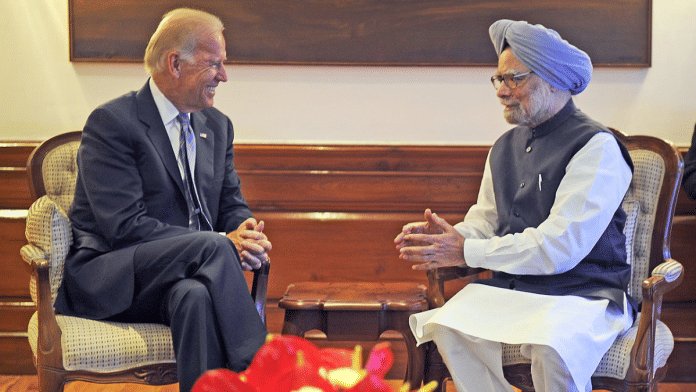New Delhi: The decisive India-US civil nuclear deal by Prime Minister Manmohan Singh changed the course of ties between the two countries, which had for decades dealt with one another with a level of suspicion. While many in India have noted the late leader’s contribution to improving ties with America, tributes have come from Washington since his demise on 26 December.
US President Joseph Biden, in his statement Friday, called Singh a “true statesman”. Biden highlighted the efforts of the late prime minister in promoting the India-US civil nuclear deal, adding that the level of cooperation seen today between the two countries would not have been possible without the efforts of Singh.
“The unprecedented level of cooperation between the United States and India today would not have been possible without the Prime Minister’s strategic vision and political courage. From forging the U.S.-India Civil Nuclear Agreement to help launch the first Quad between Indo-Pacific partners, he charted pathbreaking progress that will continue to strengthen our nations—and the world—for generations to come,” said Biden in his statement published by the White House.
“As we discussed then, the U.S.-India relationship is among the most consequential in the world. And together, as partners and friends, our nations can unlock a future of dignity and unlimited potential for all of our people.”
Biden is not the first American leader to highlight the efforts of Singh in ensuring that the civil nuclear deal would be signed. The civil nuclear deal, also known as the 1-2-3 agreement, which was first announced in 2005, was signed in 2008. However, the Singh-led United Progressive Alliance (UPA) coalition at the time faced revolt from the four Left parties, which had been supporting the government with their 60-odd Members of Parliament.
The late prime minister staked his government’s future on the deal, and was able to survive the confidence motion in July 2008, despite the loss of support from the Left parties. The deal would see India’s civil nuclear programme come under the safeguards of the International Atomic Energy Agency (IAEA), in-exchange for a waiver from the Nuclear Suppliers Group (NSG).
The NSG waiver would allow India access to civilian nuclear technology and fuel from the members of the group. India is the only non-member of the Nuclear Non-Proliferation Treaty (NPT) to receive this waiver. Subsequently to the India-US deal, New Delhi signed a raft of civil nuclear agreements with countries, including France, Russia, the UK, Canada and Kazakhstan.
“Dr. Singh was one of the greatest champions of the U.S.-India strategic partnership, and his work laid the foundation for much of what our countries have accomplished together in the past two decades. His leadership in advancing the U.S.-India Civil Nuclear Cooperation Agreement signified a major investment in the potential of the U.S.-India relationship,” said Antony J. Blinken, the US Secretary of State in his condolence message.
Condoleezza Rice, the US Secretary of State, between 2005 and 2009, when the deal was being negotiated and finalised, also described the role that Singh essayed in improving the ties between New Delhi and Washington D.C.
“I am very saddened to learn of the passing of India’s former Prime Minister Manmohan Singh – a great man and a great leader who helped to put US-Indian relations on a fundamentally new footing with the landmark US-India Civilian Nuclear Agreement of 2008,” Rice said in a post on the social media platform ‘X’.
Prime Minister Singh, she said, risked his political future and then remade his government to gain the support needed to secure a deal that would ultimately change the geopolitical trajectory of the region and have far reaching implications for decades to come.
The India-US ties have grown from strength to strength in the past two decades. In 2023, the two countries launched the Initiative on Critical and Emerging Technologies (iCET), led at the National Security Adviser level, cutting across all fields of technological cooperation. Defence ties have deepened, while the US has been one of India’s largest trading partners for the last five years.
(Edited by Tony Rai)






